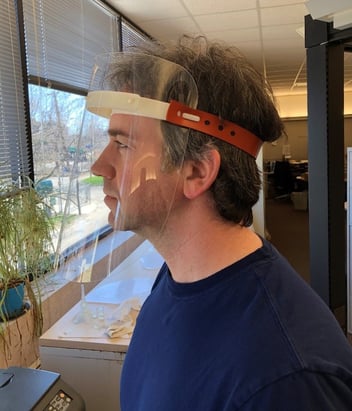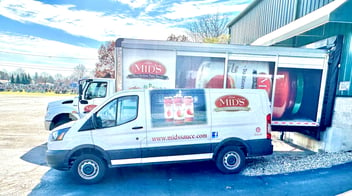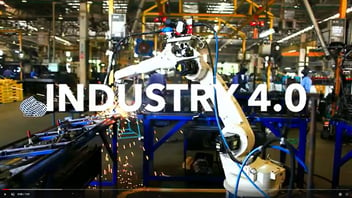How A Viral Photo Sparked an Innovative Protective Gown Solution
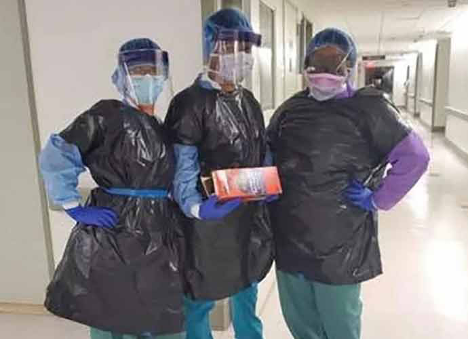
This photo of New York nurses wearing garbage bags went viral back in March, sparking outrage and concern over the lack of protective equipment on the front lines of the COVID crisis. Isolation gowns have been in sort supply across the country, so the Ohio Manufacturing Alliance to Fight COVID-19 decided to try to fill the gap.
“We needed to design a product that would meet medical standards and that could be rapidly manufactured locally at scale – all with materials that were readily available in the supply chain. Ultimately, Ohio’s unique strengths in both healthcare and manufacturing were the key to solving this complex problem quickly,” said Brandon Cornuke, VP of MAGNET’s Innovation Iterator.
The first hurdle was finding something to make the gowns from. The raw materials that are typically used ran out early in the pandemic. So, the team had to find something new.
“We tried many different fabrics. We tried Halyard, a proprietary waste plastic that normally covers exam tables. We tried rip-stop nylon, like windbreaker material. Then we talked to experts and learned that a ‘level 1’ gown had to pass a water retention test so sewing without sealing the seams would not pass that test even if we could get it sewn,” said Ethan Karp, President and CEO of MAGNET.
The team looked at all kinds of different materials and ways to make the gowns – but nothing worked. People couldn’t move easily in them. Or they wouldn’t pass the rigorous certification testing. Or there wasn’t enough of the material available. Then someone remembered that infamous photo.
“We thought about those poor nurses who had to wear garbage bags and realized that we could find plastic substitutes. The team quickly found a type of plastic that is typically used for polyethylene bags and packaging. Then we got to work making a design that could be produced at least in part by automation so we could churn these gowns out quickly and get frontline workers protected as soon as possible,“ said Dr. Karp.
MAGNET and Fastlane, at the University of Dayton Research Institute, worked together to quickly solve a number of design and production challenges. The team created several gown options and then got feedback from eight different Ohio hospitals. The final design was certified by Stress Engineering Services of Mason.
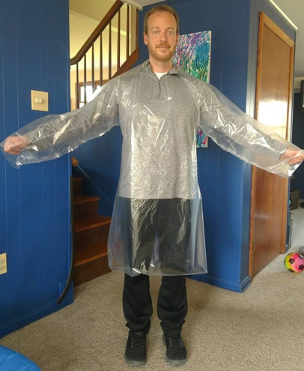
“We were pleased to learn from a hospital that our final design was even a slight improvement to gowns currently being used,” said FastLane Director Phil Ratermann.
Now, just weeks later, that new design is in production.
“We got four manufacturers tooled up and producing at a very rapid rate. The demand from hospitals, county, and state organizations far exceeded what any one manufacturer could do. But a network of motivated and capable manufacturers across the state will deliver almost a million gowns to our frontline health care workers and first responders,” said Adam Snyder, Managing Partner, Sector Partnership at MAGNET.
It would normally take months, but all this happened in weeks. The Alliance designed an alternative product, created a local supply chain to make it, and repurposed manufacturers who had never made gowns before.
“We are very proud of the work our people have done to help protect our health care workers – the frontline defense – from this horrible virus,” said Joe Blake, President of the Industry Products Company, one of the manufacturers who repurposed to make the new gowns.
“This shows the might and agility of our manufacturers. This is a highly certified product that has never been made in this region before. But with our powerful partnerships, and an urgent need, we made this happen. I truly hope this means we will never see another photo of nurses wearing garbage bags while they’re working to save lives. That was a terrible photo, but at least it has now sparked an innovation that will provide protection to countless others,” said Dr. Karp.
The gowns are now available for purchase, along with masks, gloves, and other personal protective equipment, here: Ohio Emergency PPE Maker’s Exchange. MAGNET worked with the Alliance to establish this online marketplace to help manufacturers who are repurposing sell their protective equipment to smaller buyers such as nursing homes, police forces, and other emergency personnel.
